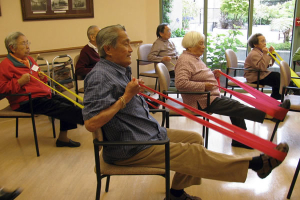 Years ago, after my grandmother died, my cousin came to live with my grandfather, whose nickname was Bubbles.
Years ago, after my grandmother died, my cousin came to live with my grandfather, whose nickname was Bubbles.
Don’t ask about the silly moniker, except I will say that (embarrassingly) it was handed down to my father, and his daughters suffered the humiliation of my mother referring to dad as “Bubbles” at restaurants and parent-teacher conferences.
Where’s the story?
PointsMentioned Map4 Points Mentioned
Back to Grandpa.
While his daughter shopped for him and did his laundry, his grandson Butchy lived with him and was in charge of keeping Grandpa “safe.” Grandpa had dementia, and his behaviors included fleeing the house in the middle of the night to the cemetery next door and leaving the gas stove on.
Butchy was in the house to keep an eye on him, but most of Grandpa’s day was spent sitting in front of the television with little stimulation.
Butchy prepared meals, but given his limited culinary skills TV dinners and canned soup were often on the menu.
However, even with his limitations, Butchy was a blessing because his presence delayed my grandfather’s placement in a nursing home.
In today’s society there aren’t many Butchys available to stay home and care for an aging loved one. And placement in a memory care facility can be prohibitively expensive.
Adult day care centers are designed for older adults who can no longer manage by themselves, or who are isolated and lonely. They enable seniors to socialize with others while still receiving needed care services. The senior spends the day and goes home to family at night.
Adult day care centers offer a host of benefits:
• Increased social interactions, which help protect against ill health
•Planned exercise programs, which are crucial for good health
•A sense of purpose, a place to belong
•A therapeutic environment with meaningful activities and stimulation
•A professional care team that allows participants to maintain a sense of personal identity, dignity and independence
•A clean, comfortable environment that is easy to navigate with wheelchairs or walkers
•Activities that bring pleasure and accomplishment
Adult day centers offer either a social model or a medical model.
Social model day care centers provide stimulating activities, art, music, pet and reminiscence therapies, nutritionally balanced meals and snacks, and help with toileting and taking medications.
Medical model day care centers, sometimes called adult day healthcare, may include additional services from nurses, therapists, social workers, psychiatrists, geriatric physicians and others. These facilities can be covered by Medicare. Social model day cares can be paid by some insurance policies but are often private pay.
Almost all adult day programs offer a sliding scale for low-income seniors.
Transportation can be provided via the center’s own transportation system, Dial-A-Ride or family members.
Most centers are open by 7:30 a.m. and close after 5 p.m. so family caregivers who are working can drop off their loved one before work and pick them up after work.
In our area, there are four adult day centers—two medical models and two social models.
Medical models include ONE Generation in Van Nuys at (818) 708-6610 and Oxnard Family Circle at (805) 385- 4180.
Social model programs include Senior Concerns at (805) 497-0189 and Camarillo Health Care District at (805) 388-1952.
All adult day centers offer services for family caregivers, including case management, support groups, information and referral, pro bono legal and financial services, and educational programs.
The programs are of particular benefit to seniors with cognitive impairment like my late grandfather since the majority of people with dementia live in the community, not in institutions. They offer a flexible and reliable solution and are one of the most affordable care solutions for a person with the disease.
Adult day programs delay institutional placement and teach family caregivers how to effectively deal with dementia.
In the last year Senior Concerns provided over 56,000 hours of care to seniors in our community and awarded more than $140,000 in scholarships for low-income seniors to attend our program. And in the last year, Senior Concerns has provided lifesaving respite for 130 family caregivers.




